- Home
- Will Hobbs
Downriver Page 7
Downriver Read online
Page 7
“How do we estimate distance?” I asked.
“String,” Adam volunteered.
“We can live off the land,” Pug said gravely, as his hand went to his giant knife.
Adam looked around. “I dunno . . . The land don’t look too edible in these parts.”
Everybody agreed we’d better try to put on some miles.
Down the river we came to the biggest rapid yet. I thought, if they keep getting worse like this, I don’t even want to think about how bad they could get. This one was on a turn, and the current was piling up against the cliff on the left in monstrous waves. Toward the bottom of the rapid, some of those waves poured over ledges into holes that looked as bad as that hole in Skull that Heather had come to know so intimately.
We scouted and talked strategy. The idea was to paddle out of that main current, to try to stay to the inside of the turn where there was a narrow strip of relatively calm water. The only problem was, all the current in the fast water would be pushing us toward the cliff and the big white water.
The longer you look at a rapid like that, the sicker you feel. Your insides churn, and your stomach does flips. The only relief is to get in the boats and just do it. When you secure the bowline and push off the bank, and you start drifting toward the lip of the rapid, it feels like you’re about to jump out of an airplane or rob a bank or something. There’s so much adrenaline in your system, you’re giddy, sick, high, panicky, and courageous all at the same time.
But most of all, you’re tuned in. You’re right there. I heard Adam chant from behind me, “Let’s head downriver, mates.” I could see every little thing. I saw what the water was doing, I saw the bands of color on the cliff down on the left side where we didn’t want to go, I saw a swallow skim the flat water on the top of the rapid, I saw Troy disappear over the edge, I noticed the woven friendship bracelet on Star’s wrist. I heard the roar of the rapid and I heard a raven squawk. I felt the strength in my arms and my back and my legs. In answer to Adam’s commands, I paddled with sweeping strokes to help move to the right. “Downriver!” I yelled.
As we approached the brink and could see the course of the rapid below us, I saw Troy’s boat down toward the bottom. He was in the big stuff, exactly where he didn’t want to be. Up against the cliffs, his boat slid over a ledge and dropped into a hole that stood his sixteen-foot boat straight up in the air. It looked certain to flip, but it dropped down right side up and was spit out of the hole. It all happened in an instant, and then I lost sight.
We were in a major fight ourselves to get out of the current, and we were winning it. We paddled like anything for the inside of the turn, and we made it. We scooted past all the nasty water, barely out of its reach on that ribbon of safe water.
“We did it!” I shouted. “We’re really doing it!”
Whatever the name of that rapid, our paddle crew celebrated a major victory. Adam was the man of the moment, and we all felt good about ourselves. We’d applied a strategy to a nasty-looking rapid, and it had worked. As we paddled up to him, Troy was methodically bailing out his boat. Somebody asked him how his run was, and he said, “Fine,” but with little enthusiasm. I could tell from the reactions on the paddle raft that no one but I had seen him do that dramatic stand-up.
“Actually,” Troy admitted, “this boat is pretty unstable with no weight up front—it wants to lift up on me. Jessie, would you come over and keep the front end down?”
There was a little snickering over that, but I suppose that was inevitable with Troy and me being friendly.
Under the circumstances, I wasn’t sure I wanted to go over to the other boat, and I wasn’t sure I wanted to give up paddling when I’d been enjoying it so much. There’d be nothing to do in the front of the rowed raft. Paddling up there would be pointless.
Adam could see my hesitation. “Go ahead, Jessie. You’d look great up there . . . kind of like those carved ladies they had on those old sailing ships.”
“More like a hood ornament,” Rita said.
“Okay, you guys,” I said. “Stuff it.” I stowed my paddle under the net holding the gear in the middle of the paddle raft, and I stepped over to Troy’s boat, to the applause of my former shipmates. I wasn’t going to let them sway me one way or the other. The bottom line was, I knew Troy needed me.
As we drifted downstream, I did feel a little like Troy’s hood ornament, but I got over it. We liked each other, and I liked being with him on his boat. As the afternoon wore on, we had a sense that we were having our own separate experience. We talked a lot, mostly about the trip and, very softly, about the other people. Voices carry so easily on the river. We could hear everything they were saying on the other boat, even when they were way behind us.
The current picked up and we entered a wild stretch of river. There were rapids every half mile or so. Troy would stand up in the boat and look at the rapid coming up, and determine that scouting from the boat was sufficient without having to go to shore. I was glad. We were too tired to scramble around in the rocks and study every one of these rapids. “Read ’n’ run!” he’d holler back to the paddle raft. “Read ’n’ run!”
The next stretch was a wild time. I loved being in the front of the boat, taking all the big waves, and looking back to Troy at work on the oars. He really loved the white water. In the rapids he wore a wonderful grin all over his face, and his blue eyes were all concentration looking downstream. He was learning how to move that boat, how to spin it to avoid the rocks and holes. He was learning when to apply power and when to apply finesse.
I watched the runs the paddle raft was making behind us as well. I heard Adam saying that as long as he kept the boat straight, they could blow through the holes, and that’s what they were doing, going intentionally for the action. He’d yell for them to power to the right or left, and then he’d rudder the boat directly for the hole. They were having a blast. I felt like I was missing something, but that was okay. I was doing just fine relaxing in the warm sunshine, and I loved having the time with Troy.
We could hear another rapid coming, but we couldn’t see it because it was on a sharp turn. “Should we scout it?” I asked Troy. He wagged his head. He was taken with the string of successes behind us, and having too much fun rowing to want to pull the boat to shore, tie it up, and go for a look. We rounded the bend in the center of the river and caught sight of a major hole only thirty or so feet in front of us.
There was no time to cock the boat and row to either side. All Troy could do was hit the hole straight on. I speared my weight to the very front as we dropped into the hole, and then I felt the oddest sensation. We had stopped moving. We were surfing in place. Suddenly the hole spun us sideways, and one side of the boat lifted up in the air as the low side was filling with water. My eyes met Troy’s for a minute. He was at a loss. I lunged for the high side, to try to put some weight on it. Just as suddenly, the hole spit us out. “Bail!” Troy yelled. We were suddenly knee-deep in water.
Around the bend came the paddle raft, only they were on the inside of the turn as they approached the hole. They would have missed it, but they were paddling like crazy to line up for it on purpose. When they dropped into it, the hole spun them sideways too. They had no more control than a stick of driftwood. The black underside of their boat showed for a moment, and then the boat turned over. They’d flipped!
I saw swimmers. A couple of people were bobbing along in the river; Adam was hanging on to the chicken line on the overturned boat. Troy bent his back to the oars and rowed toward an eddy, so we wouldn’t be swept downstream. “Bail!” he yelled. “Boat’s too heavy to row! Bail!”
I bailed like mad with that big bucket, and Troy caught the eddy. As the swimmers approached us, he rowed out into the current and I hauled Rita aboard. Troy intercepted Adam, who was clinging to the paddle raft. “We hit the hole straight on,” Adam protested. “I don’t know what happened.”
Freddy and Pug, I could see, had reached the shore on their own, but where w
as Star?
“Over there!” I yelled, and pointed at Star in the river.
We dragged Star in. She was so weak, she couldn’t help herself at all. She wasn’t built with any insulation against that icy water, and as it turned out, she’d been held in the hole and given a thrashing.
We made a quick landfall, as Freddy and Pug ran downstream to join us. There was no beach there. It wasn’t really a camp, but we had work to do, with the paddle raft to overturn, and little time—the sun was down from the canyon. We were all shivering, especially Star, whose eyes weren’t even focusing. We had to get to the dry bags under the paddle raft, and put on some dry clothes. It took all of us, minus Star, to turn the boat over. Any kind of beach would’ve been handy, but there was a deep drop-off right at the bank. We had to use a lot of ropes, and pull on them with all our strength. For a while it looked like we wouldn’t succeed. Three times the boat came about halfway up and then stalled. Adam said to Troy, “I sure hope that gear boat of yours never flips. It weighs about three times as much as this one.”
We gave it one more try, and this time Pug went berserk, giving a ferocious battle cry and pulling on his rope like a Goliath. His mighty legs dug for traction, and in the end he fell into a pile of sharp rocks as the boat fell right side up against the bank.
Pug came up full of scrapes and scratches, but he thought nothing of them, being the man of the moment and the recipient of truckloads of praise. He was beaming. That butch marine crewcut of his, about a month grown out, made him seem like a little fuzzball kid in a giant body, a little kid who only wanted the rest of the gang to like him. Rita went over to him and raised his right arm like a boxer’s in triumph, then felt his biceps. “Hot stuff,” she declared.
It was our first night in camp on the river. Nobody wanted to follow Al’s work list, which was taped to the inside of the lid of the kitchen box. “Who needs it?” Troy said. We didn’t set up the latrine, either. We were just too exhausted. “Just dig a cat hole behind a bush,” Troy said.
Thank goodness Rita had some energy. She whipped dinner together—beef stroganoff, no less—and it was much appreciated. We did the dishes by lantern light, then crashed. None of us put up a tent. Exhausted doesn’t begin to describe how I felt. Star and I spread our tent out and used it for a ground cloth. Star was pretty out of it, still in shock from her swim. “Are you okay?” I asked her, as I was falling asleep.
“Perfect,” she said.
// 8
As if I weren’t tired enough, my dreams wouldn’t let me get off the river, and I was paddling on and on in my sleep, tossing and turning, paddling for my life through ever-taller waves and gaping holes. Every moment was an emergency; the white water never let up. Finally we tipped up on a huge rock, and I was thrown overboard. Then I was tumbling and tossing among the surging waves, and I felt myself being swept away, farther and farther downriver, swept away, swept away. . . .
My own voice woke me up. Star’s hand was on my shoulder. “You were having a nightmare,” she said.
“It was awful. What was I saying?”
“You were calling for your mother.”
“Are you sure?” I asked. I had no memory of dreaming about my mother. I was trembling, having a hard time even getting a fix on where I was. Then it all came back. The Grand Canyon . . .
“There’s no way I’m going to be able to get back to sleep,” I said.
“Me neither. I’ve been lying awake for hours.”
“You want to take a walk down the shore? I can’t just lie here, I’ll go crazy.”
We put on our jackets, which we were using for pillows, grabbed our flashlights and wool caps, and slipped out of camp. Even in the desert, it was cold at night, at least in October. We found a little sandy beach a way downstream, sat down huddled side by side, and turned off our flashlights. For a long while we didn’t speak, but watched the sliver of a moon set, and then took in the light of a billion stars playing on the surface of the river. Close by, the water was reverberating on a willow shoot, and from upstream came the dull roar of the rapid that Star and the others had swum. The seconds slowed, and then the minutes slowed, and I could feel a fear creeping into my bones and taking me over, a sort of fear I’d only had glimpses of before. Maybe it was the sort that prehistoric people felt, knowing how small and defenseless they were against the huge nothingness of it all. I felt like I was being crushed by the immensity of the darkness, the river, the walls, the stars. My heart was pounding, I felt like crying out. It came to me for the first time, the full realization of what I had done.
A shooting star made a long and instantaneous track from above us downriver. “Did you see that?” asked Star.
“Yes,” I answered. “Wasn’t it sad? Our lives are like that, don’t you think?”
“Oh no . . . it’s a good sign.”
“I remember. Silver starlight—your soul color.”
For a while we didn’t speak again, and then I said, “In my nightmare, I was drowning, but you’re the one who was really out in the river, and you had a bad swim, like Heather’s.”
“I did,” she said tentatively.
“How do you do it?”
“Do what?”
“Stay so calm.”
“I try to think positive.”
“Like when we lay down to sleep, and I asked how you were, and you said, ‘Perfect.’”
She didn’t reply.
“Did you feel perfect?” I asked gently.
Her hand went to the crystal around her neck. “I was so scared, Jessie, but I can’t think about it. I have to keep preparing the path I’m going to walk on.”
“You don’t think it was your fault that you got thrown out of the boat, do you?”
“I have to try harder, keep my concentration.”
“You ‘imaged’ it?”
“Maybe I did. . . .”
“If you image something in your dreams, does that make it happen?”
“I don’t know,” she said. She knew what I was thinking—was I going to drown on this trip?
“Do you ever have bad dreams . . . nightmares?” I asked her.
“I do,” she answered slowly. “Mostly about my mother. She left me when I was about seven.”
When Star didn’t continue, I said, “My mother died from cancer when I was five. She went away to the hospital, and my dad took me to see her a few times . . . he told me she was going to die, but I don’t think I understood what that meant. Then one day he told me she was dead. I never saw her again. At the funeral her casket was closed. I thought for the longest time she would be coming back. I would dream she was back. . . .”
“I know,” Star said softly, with more emotion in her voice than I’d ever heard before. “It was like that for me too. We were always moving around, never staying long in one place. Then one time she took me to this shelter—some kind of a church home, with a lot of other families, living like in a dormitory. We were only there a few days when she said she was going out and she’d be right back. She never came back.”
I was starting to speak, about to suggest that maybe her mother was abducted or murdered. But Star shook her head. “She didn’t want me. I waited for months, I waited for years, in institutions, foster homes. People would tell me things happened to her, but deep down I knew. She just didn’t want me.”
I hugged her close. “I’m so sorry, Star.”
As I hugged her I realized why she didn’t mix with everybody. It wasn’t because she was shy. She wasn’t really a teenager, like the rest of us. She wasn’t a child or an adult either. Star was her own creation, and not by choice. It must be so lonely, I thought, being her.
“It’s my karma,” Star said. “I can’t feel sorry for myself. Jessie, you know the part I think about the most? When my mother left, she was pregnant. That means I have a sister or a brother out there somewhere. I feel like it’s a sister, and I think about her a lot. Maybe someday our paths will cross, and we’ll know. . . .”
�
�What about your father?” I asked softly.
“I don’t have any idea who he was.”
“How long did you live out on the street?”
“Basically, the last two years.”
“What city?”
“Portland, and then Los Angeles.”
“You don’t need to tell me this, but . . . is it as awful as they say . . . the things you have to do to survive?”
“It is, Jessie. It really is.”
“There’s so much cruelty in the world,” I said. I couldn’t find the words. I couldn’t really know or appreciate what she’d been through, I realized, but I could sure understand her crystals and her Tarot deck a whole lot better. It was her only protection.
“You’re so lucky to have a father, Jessie. He’s not cruel, is he?”
“Oh no, he doesn’t have a mean bone in his body. But we’re definitely not getting along right now. I feel terrible about it.”
“It’ll get better, Jessie.”
“You really think so?”
She gave me a hug. “Dawn’s coming,” she said, pointing to the faint light over the rim of the canyon. “A brand-new day.”
Just then came the song of the canyon wren, that rich, clean cascade of slowing and falling whistles, as the canyon walls began to catch the faint glow of dawn. We looked at each other and smiled.
“Whatever happens,” I told her, “we have each other. Friends, come what may—agreed?”
Star smiled, and her smile didn’t seem quite so forlorn.
I tugged at the woven friendship bracelet around her ankle. “Anyway I think your theory about imaging is a bunch of bull. If it were true, I’d be rich from imaging myself winning the lottery.”
She laughed, and then she untied the bracelet from her ankle. For a moment she held it against the one on her wrist, and then she said, “Would you keep it, to remember me by?”
“Tie it on my wrist for me. But what’s this ‘to remember me by’ stuff?”
“Nothing,” she said. “You know. . . .”

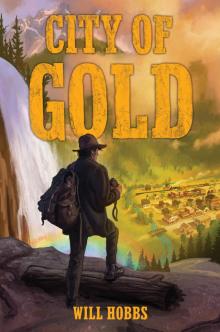 City of Gold
City of Gold Kokopelli's Flute
Kokopelli's Flute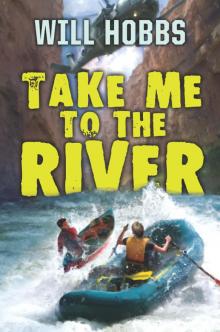 Take Me to the River
Take Me to the River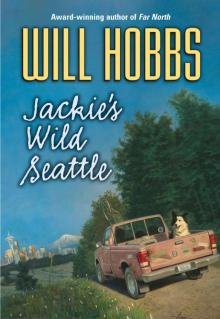 Jackie's Wild Seattle
Jackie's Wild Seattle The Maze
The Maze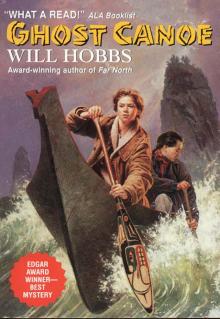 Ghost Canoe
Ghost Canoe Never Say Die
Never Say Die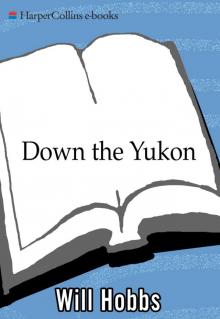 Down the Yukon
Down the Yukon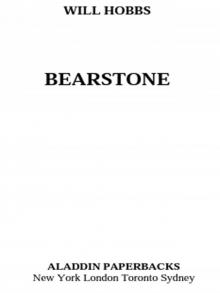 Bearstone
Bearstone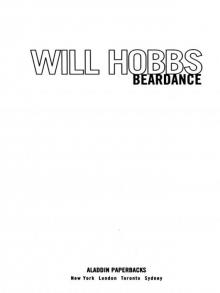 Beardance
Beardance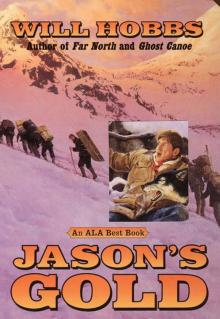 Jason's Gold
Jason's Gold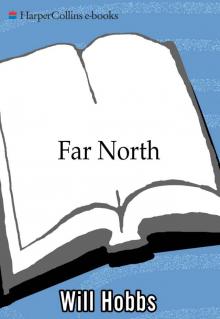 Far North
Far North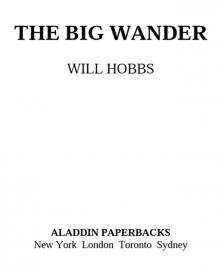 The Big Wander
The Big Wander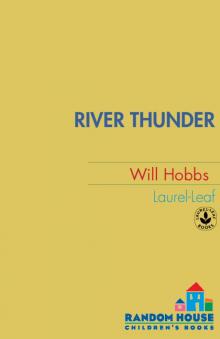 River Thunder
River Thunder Downriver
Downriver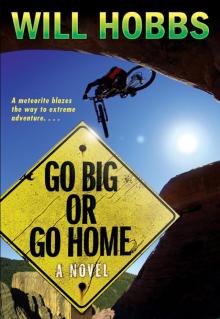 Go Big or Go Home
Go Big or Go Home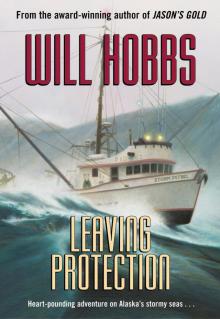 Leaving Protection
Leaving Protection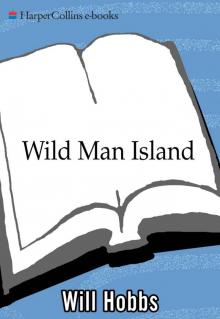 Wild Man Island
Wild Man Island